On November 5, 2009, the program entitled “Buildin’ Bridges and Stirrin’ Waters: Women of Color Feminism and Activism” was organized by the Asian American Studies Center staff and students as part of the 40th anniversary of UCLA Ethnic Studies. Celebrating the first women’s issue since the 1970s, Amerasia’s “Where Women Tell Stories” (Vol. 35, No. 1, 2009) gives a diverse sampling of stories by women who have been connected with social movements. The evening program’s featured speakers were: Ericka Huggins, guest co-editors Stephanie Santos and Mary Kao, Carrie Usui, and Mo Nishida.
The event was co-sponsored and/or endorsed by an impressive array of groups: USAC/ACC Academic Success Referendum Fund, Asian Pacific Coalition, American Indian Studies Center, Asian American Studies Center, Asian American Studies Graduate Student Association, Asian American & Pacific Islander Studies Undergraduate Assn., Bunche Center for African American Studies, Center for the Study of Women, Critical Asan & Pacific Islander Students for Action, Department of History, and Powell College Library. It was supported by: Asian American Studies Department, Afrikan Womyn’s Collective, Chicano Studies Research Center and the Graduate Coalition of Native Pacific.
Following is the “To Our Readers” and Table of Contents for the issue “Where Women Tell Stories,” printed in full. A later blog entry includes the guest editors’ introductions to “Where Women Tell Stories” with more photographs of this event. (All photographs by John Kao)
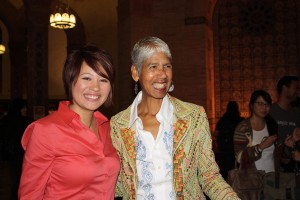
Kristen Lee, emcee for the evening and M.A. student in Asian American Studies with Professor Huggins.
To Our Readers
Living Sources: A Notation
Ericka Huggins, in her conversation with Yuri Kochiyama in this issue, talks about some of her collaborative work acting as “the bridge between the live source and academia.” With this issue, editors Mary Uyematsu Kao and Stephanie Santos have also created this bridge—a “living source,” which is an unique assemblage of Asian American and women of color narratives in the form of story, essay, poem, dialogue, memoir, reportage, and photographs.
This issue helps to radically synthesize and link the disparate approaches often seen in the work of writers, activists, cultural workers and artists—and traditional academics and scholars. Here, the theoretical is embedded in praxis, and the practice of writing itself creates new ideas and new places, along the lines of what the late pioneering African American scholar Barbara Christian had suggested in her critical studies on race, class, and gender in which she argued that theory and language provided “nourishment” for people and enabled them to live better lives.
Powerfully, this special issue, entitled “Where Women Tell Stories” also bridges and extends the tradition begun by two pioneering Asian American editors: Emma Gee, who taught the first course and produced some of the first books on Asian American women at U.C. Berkeley and at UCLA, and Amy Uyematsu, who edited Roots, a best-selling textbook and now a classic archival source for examining the origins and thinking of Asian American Studies.
Mary and Stephanie, my working colleagues, had chided me about not ever having an issue specifically devoted to women’s lives, and I protested that Amerasia had in fact published much scholarship and writing by and about women, directly and indirectly, especially focusing on: realms of sexuality and gender inequality; on Pacific Islander perspectives on gender, sovereignty and culture; on Edward Said, feminism, and Asian American Studies; and most recently, a special issue on the marriage equality debate. But my colleagues persisted in reminding me that “reading between the lines” was not enough, and, in the end, I invited them to be the consulting editors for this special issue because they had a unique approach to examining the current experiences of Asian American women.
Their explicit approach was unique in that they wanted to foreground—through multiple narrative genres—the experiences and lives of Asian American women today—but in the context of multiracial women, of working class women, and of women who were to some degree activists in society and politics. The work they have collected and organized for this edition during the past two years testify to this ambitious goal, and, in fact, their “cup runneth over.” Thus, this issue will continue into the subsequent summer issue, Volume 35, Number 2*, which will feature additional perspectives by Asian American women scholars, writers, and students that amplify the contributions the editors have made to our understanding of the lives of Asian American women, men, and communities.
—Russell C. Leong
Table of Contents for “Where Women Tell Stories” (Amerasia 35:1, 2009)
i. narratives
Subverting the Hierarchy/Collaborating Narratives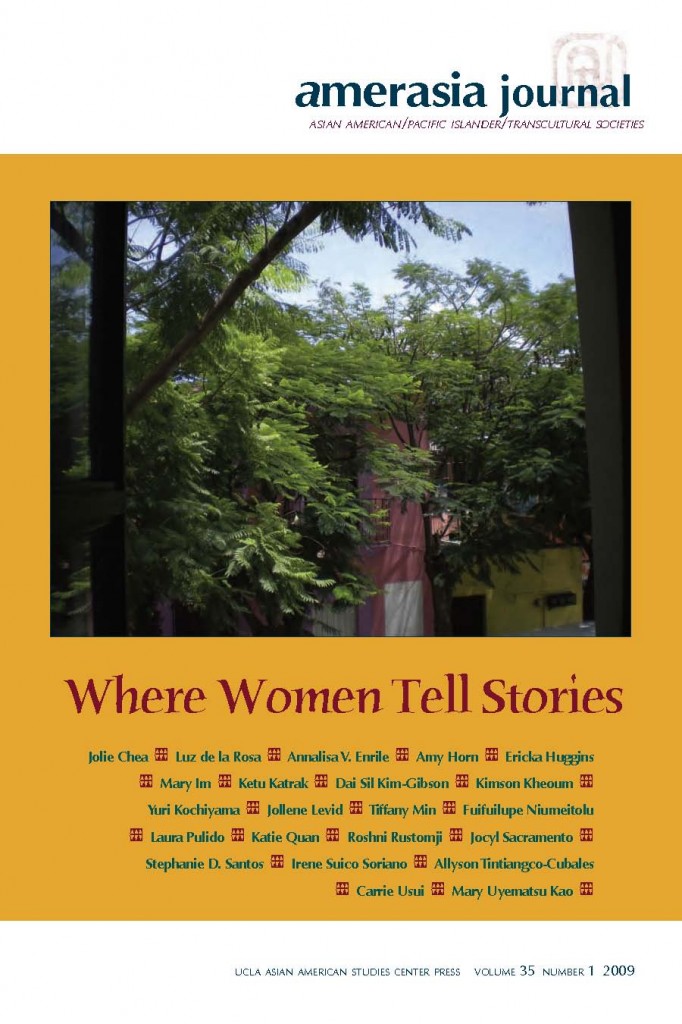
by Roshni Rustomji and Luz de la Rosa
Refugee Acts: Articulating Silences Through
Critical Remembering and Re-Membering by Jolie Chea
Do You Hear Their Voices? by Dai Sil Kim-Gibson
Mother, May I? by Carrie Usui
Balitaan, Lorena, and Mar’ by Irene Suico Soriano
ii. power
Memories of the 1982 ILGWU Strike in
New York Chinatown by Katie Quan
GAB[riela]Net[work]: A Case Study of Transnational Sisterhood
and Organizing by Annalisa V. Enrile and Jollene Levid
LA Story and You Return by Fuifuilupe Niumeitolu
Three-Step Boogie in 1970s Los Angeles: Sansei Women
in the Asian American Movement by Mary Uyematsu Kao
iii. knowledge
“Stirrin’ Waters” ‘n Buildin’ Bridges: A Conversation with Ericka Huggins
and Yuri Kochiyama by Yuri Kochiyama, Ericka Huggins, and Mary Uyematsu Kao
Immigration Politics and Motherhood by Laura Pulido
Practicing Pinayist Pedagogy
by Allyson Tintiangco-Cubales and Jocyl Sacramento
Khmer Girls in Action
Women by Tiffany Min
Refugee by Kimson Kheoum
To the Lady that Thinks She Knows by Mary Im
She Swallows My Dream by Amy Horn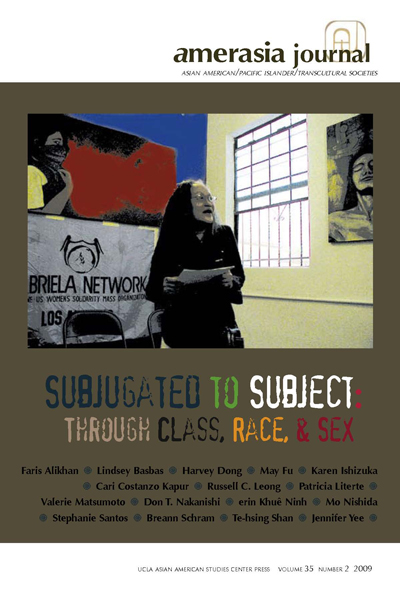
Transnational Links: South Asian American Women’s Organizations
and Autonomous Women’s Groups in India by Ketu H. Katrak
*”Subjugated to Subject: Through Class, Race, and Sex“ (Amerasia Vol. 35, No. 2 2009) contains notable articles that were originally meant to be published as part of “Where Women Tell Stories.” Because of time constraints and an already oversize issue, “Subjugated to Subject” is the continuation of the women’s issues. The particular articles that are inclusive to the women’s issue are:
The Death of Eugenia Baja: Feminicide and Transnational Feminist
Organizing among Filipina Migrant Workers by Stephanie D. Santos
Ways of Knowing, Feeling, Being, and Doing: Toward an Asian American
and Pacific Islander Feminist Epistemology by Jennifer A. Yee
Flying in the Face of Race, Gender, Class and Age: A Story about Kazu Iijima,
One of the Mothers of the Asian American Movement
on the First Year Anniversary of Her Death by Karen L. Ishizuka
On Contradiction: Theory and Transformation in
Detroit’s Asian Political Alliance by May C. Fu

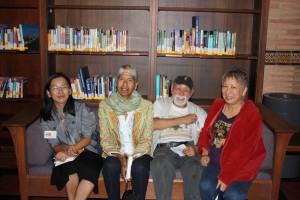
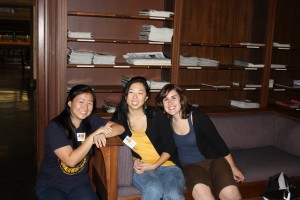
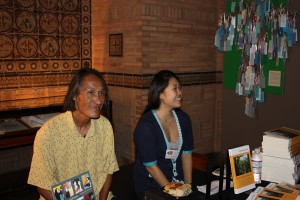
 Amerasia on Facebook!
Amerasia on Facebook!